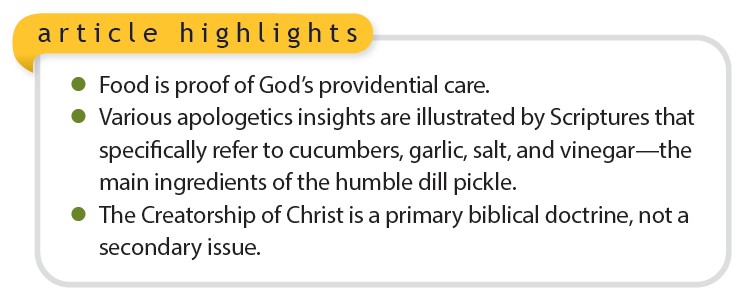 Food, even dill pickles, can provide relevant insights for creation apologetics.1 Since November 14th is National Pickle Day, this is a good time to consider how dill pickles can remind us of four apologetics values.1,2 These four priorities connect specific Scriptures to dill, cucumbers, garlic, salt, and vinegar—basic ingredients for making kosher dill pickles.2
Food, even dill pickles, can provide relevant insights for creation apologetics.1 Since November 14th is National Pickle Day, this is a good time to consider how dill pickles can remind us of four apologetics values.1,2 These four priorities connect specific Scriptures to dill, cucumbers, garlic, salt, and vinegar—basic ingredients for making kosher dill pickles.2Cucumbers, Garlic, and Corroborating Scripture
When Scripture portrays human nature, it’s realistic. Human communication, when reported in Scripture, matches how real people communicate. Scripture records quotations that fit real-world experiences, such as icy vocabulary used during Job’s lifetime that likely corresponds to the post-Flood Ice Age.3 Accordingly, it’s not surprising that murmuring Hebrews, during their Exodus testings, mentioned foods that matched their Egyptian diets, as they complained of missing “the cucumbers…and the garlic” (Numbers 11:5).
Accordingly, even grumpy allusions to cucumbers and garlic—by Hebrews who escaped Egyptian slavery—can remind us that the Bible’s detailed record of human history events perfectly fits the real world.
Salt for Seasoning and Countering False Teachings
Christians are charged with the responsibility to “contend earnestly for the faith” (Jude 1:3-4), both defensively and counteroffensively. God’s truth needs to be explained to contradict and refute many false teachings, such as Darwin’s “natural selection” theory.
However, Christians should engage in such conflicts and dialogues with all due respect, meekly—communicating graciously—as if delivering “food for thought” seasoned with salt.4
Salt can make less-than-flavorful food more enjoyable (Job 6:6). Likewise, to encourage a receptive response, our presentations of God’s truth should share information “seasoned with salt.”4
Vinegar for Soaking and Clarifying Confusion
Some portions of Scripture are “hard to understand” (2 Peter 3:16), so many individuals are puzzled or confused by complicated topics that need patient clarification.
One example is the usage of sponge-soaked vinegar during Christ’s crucifixion (Matthew 27:34, 48; Mark 15:36; Luke 23:36; John 19:29-30), the details of which are confusing—unless carefully reviewed. Some question the Bible’s consistency, criticizing how it reports Christ rejecting vinegar, but elsewhere reports Him accepting (drinking) vinegar. There is no inconsistency—because Christ rejected vinegar mixed with painkiller (Mark 15:23), yet later drank vinegar without painkiller (Mark 15:36).5
This interpretation pickle reminds us to help guide those who misunderstand God’s truth.
Dill, Proportionality, and Crediting Christ’s Creatorship
Dill was mentioned by our Lord Jesus Christ when He criticized Pharisees for their lopsided priorities regarding how they lived. The Pharisees paid great attention to tithing dill, mint, cumin, and anise—yet not to “weightier matters,” such as “judgment, mercy, and faith” (Matthew 23:23-26). What disproportionate values! Yet Christ commended proper attention to dill, while He simultaneously rebuked Pharisaical neglect of higher moral obligations.
Likewise, many appreciate small blessings in life, yet fail to fully prize Christ as our Creator. Some (e.g., theistic evolutionists) ignore the Bible’s teachings about creation—sidestepping controversies that they deem “secondary issues” and acting as if they only care about “primary” priorities.
However, the Creator is none other than the preeminence-deserving Lord Jesus Christ Himself (John 1:1-3; Colossians 1:14-17; Hebrews 1:1-3), so there is nothing “secondary” about Christ deserving what ICR President Dr. Randy Guliuzza calls “rightful credit” for being Creator of all creation.6
References
-
Acts 14:17, explained in Johnson, J. J. S. 2011. Our Daily Bread: How Food Proves God’s Providence. Acts & Facts. 40 (4): 8-9. About “National Pickle Day”, see nationaldaycalendar.com/national-pickle-
day-november-14. - Regarding these four apologetics benefits, see Johnson, J. J. S. 2017. Polar Bears, Fitted to Fill and Flourish. Acts & Facts. 46 (8): 21.
- Johnson, J. J. S. 2014. Job’s Icy Vocabulary. Acts & Facts. 43 (12): 19.
- Colossians 4:6; 1 Peter 3:15. See also Johnson, J. J. S. 2015. A Secret Weapon for Apologetics. Acts & Facts. 44 (5): 20, illustrating Ephesians 4:15 (quoting Carl Fahrner).
- Morris, H. M. 2006. The New Defender’s Study Bible. Nashville, TN: World Publishing, Inc., 1616-1617, cited in Johnson, J. J. S. 2010. Tackling Charges of Biblical Inconsistency. Acts & Facts. 39 (7): 8-9.
- “ICR exists to demonstrate that worship should be the normal response to science by using science as it’s supposed to be used. That is, to render honor and glory in the most basic way that Christians can—by regularly accentuating the rightful credit due to Jesus as our Creator.” Guliuzza, R. J. 2021. The Mission of the Institute for Creation Research. Acts & Facts. 50 (2): 5-7.
* Dr. Johnson is Associate Professor of Apologetics and Chief Academic Officer at the Institute for Creation Research.














